Gibb's Reflection on Outpatient Care in Gynecology Department Nursing
VerifiedAdded on 2022/08/28
|6
|1239
|36
Report
AI Summary
This report presents a nursing student's reflection on their experience in the gynecology outpatient department, utilizing the Gibb's Reflection Cycle. The student recounts a specific instance where they observed a doctor's insensitive behavior towards a patient struggling with conception. The student details their feelings of discomfort and their subsequent conversation with the doctor, who acknowledged his mistake. The report evaluates the situation, highlighting the importance of patient-centered care, empathy, and effective communication. It analyzes the impact of the experience on the student's understanding of ethical nursing practices and the need to advocate for patients' well-being. The conclusion emphasizes the importance of prioritizing ethical principles and outlines an action plan for future practice, focusing on patient-centered care, improved communication skills, and the establishment of strong nurse-patient relationships. The student also highlights the importance of challenging colleagues when patient health is at risk and supporting fellow practitioners.

Nursing 1
NURSING
by [NAME]
Course
Professor’s Name
Institution
Location of Institution
Date
NURSING
by [NAME]
Course
Professor’s Name
Institution
Location of Institution
Date
Paraphrase This Document
Need a fresh take? Get an instant paraphrase of this document with our AI Paraphraser
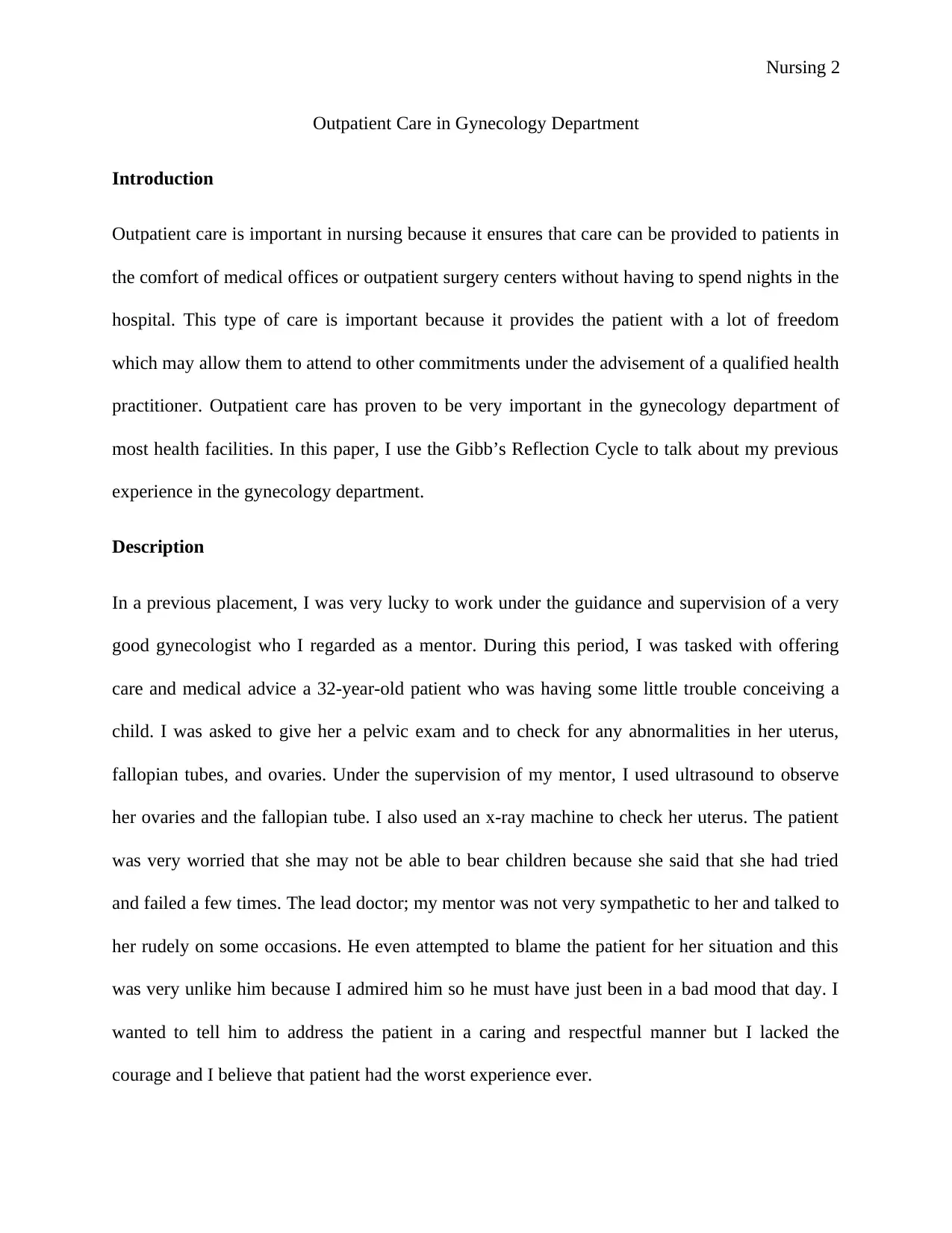
Nursing 2
Outpatient Care in Gynecology Department
Introduction
Outpatient care is important in nursing because it ensures that care can be provided to patients in
the comfort of medical offices or outpatient surgery centers without having to spend nights in the
hospital. This type of care is important because it provides the patient with a lot of freedom
which may allow them to attend to other commitments under the advisement of a qualified health
practitioner. Outpatient care has proven to be very important in the gynecology department of
most health facilities. In this paper, I use the Gibb’s Reflection Cycle to talk about my previous
experience in the gynecology department.
Description
In a previous placement, I was very lucky to work under the guidance and supervision of a very
good gynecologist who I regarded as a mentor. During this period, I was tasked with offering
care and medical advice a 32-year-old patient who was having some little trouble conceiving a
child. I was asked to give her a pelvic exam and to check for any abnormalities in her uterus,
fallopian tubes, and ovaries. Under the supervision of my mentor, I used ultrasound to observe
her ovaries and the fallopian tube. I also used an x-ray machine to check her uterus. The patient
was very worried that she may not be able to bear children because she said that she had tried
and failed a few times. The lead doctor; my mentor was not very sympathetic to her and talked to
her rudely on some occasions. He even attempted to blame the patient for her situation and this
was very unlike him because I admired him so he must have just been in a bad mood that day. I
wanted to tell him to address the patient in a caring and respectful manner but I lacked the
courage and I believe that patient had the worst experience ever.
Outpatient Care in Gynecology Department
Introduction
Outpatient care is important in nursing because it ensures that care can be provided to patients in
the comfort of medical offices or outpatient surgery centers without having to spend nights in the
hospital. This type of care is important because it provides the patient with a lot of freedom
which may allow them to attend to other commitments under the advisement of a qualified health
practitioner. Outpatient care has proven to be very important in the gynecology department of
most health facilities. In this paper, I use the Gibb’s Reflection Cycle to talk about my previous
experience in the gynecology department.
Description
In a previous placement, I was very lucky to work under the guidance and supervision of a very
good gynecologist who I regarded as a mentor. During this period, I was tasked with offering
care and medical advice a 32-year-old patient who was having some little trouble conceiving a
child. I was asked to give her a pelvic exam and to check for any abnormalities in her uterus,
fallopian tubes, and ovaries. Under the supervision of my mentor, I used ultrasound to observe
her ovaries and the fallopian tube. I also used an x-ray machine to check her uterus. The patient
was very worried that she may not be able to bear children because she said that she had tried
and failed a few times. The lead doctor; my mentor was not very sympathetic to her and talked to
her rudely on some occasions. He even attempted to blame the patient for her situation and this
was very unlike him because I admired him so he must have just been in a bad mood that day. I
wanted to tell him to address the patient in a caring and respectful manner but I lacked the
courage and I believe that patient had the worst experience ever.
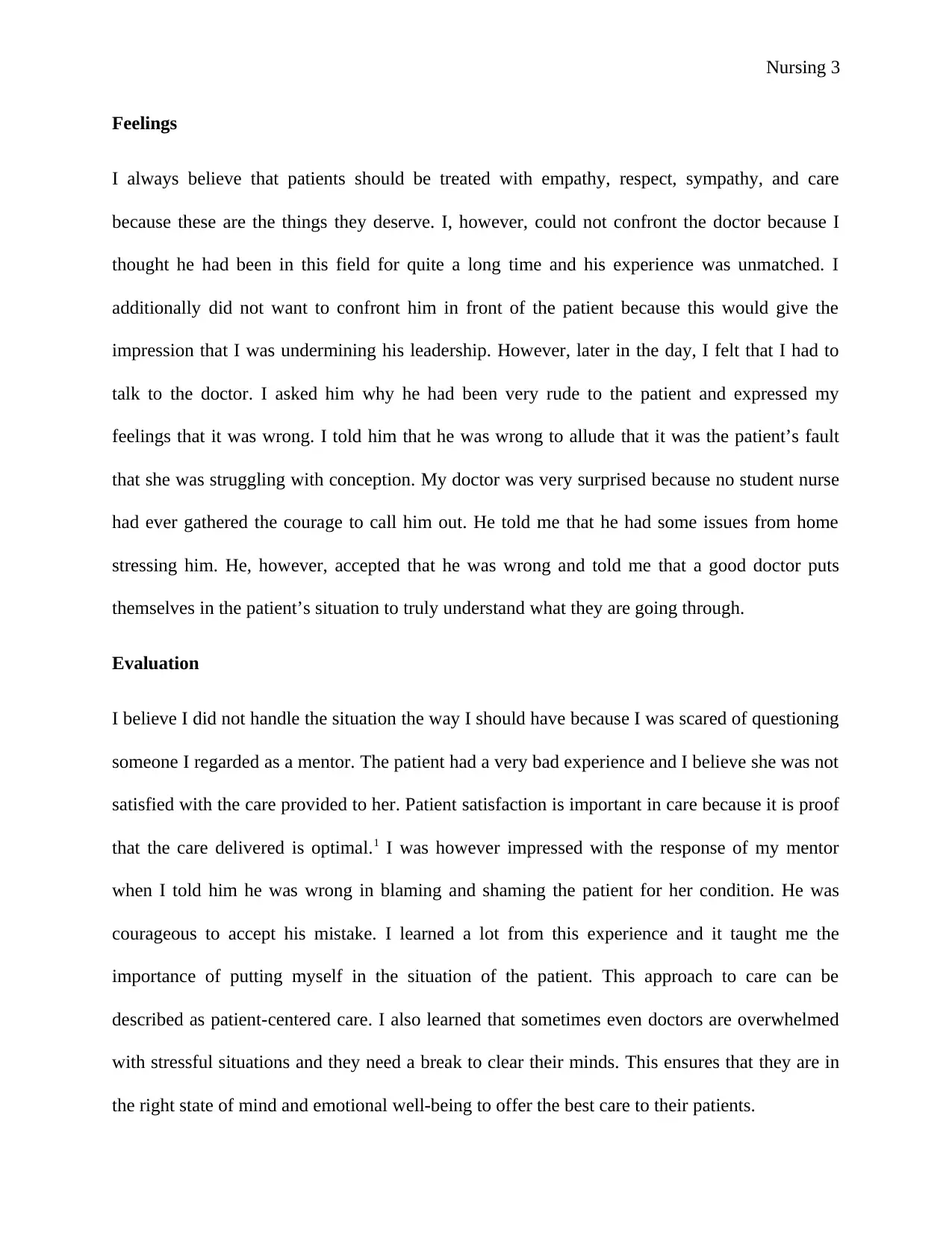
Nursing 3
Feelings
I always believe that patients should be treated with empathy, respect, sympathy, and care
because these are the things they deserve. I, however, could not confront the doctor because I
thought he had been in this field for quite a long time and his experience was unmatched. I
additionally did not want to confront him in front of the patient because this would give the
impression that I was undermining his leadership. However, later in the day, I felt that I had to
talk to the doctor. I asked him why he had been very rude to the patient and expressed my
feelings that it was wrong. I told him that he was wrong to allude that it was the patient’s fault
that she was struggling with conception. My doctor was very surprised because no student nurse
had ever gathered the courage to call him out. He told me that he had some issues from home
stressing him. He, however, accepted that he was wrong and told me that a good doctor puts
themselves in the patient’s situation to truly understand what they are going through.
Evaluation
I believe I did not handle the situation the way I should have because I was scared of questioning
someone I regarded as a mentor. The patient had a very bad experience and I believe she was not
satisfied with the care provided to her. Patient satisfaction is important in care because it is proof
that the care delivered is optimal.1 I was however impressed with the response of my mentor
when I told him he was wrong in blaming and shaming the patient for her condition. He was
courageous to accept his mistake. I learned a lot from this experience and it taught me the
importance of putting myself in the situation of the patient. This approach to care can be
described as patient-centered care. I also learned that sometimes even doctors are overwhelmed
with stressful situations and they need a break to clear their minds. This ensures that they are in
the right state of mind and emotional well-being to offer the best care to their patients.
Feelings
I always believe that patients should be treated with empathy, respect, sympathy, and care
because these are the things they deserve. I, however, could not confront the doctor because I
thought he had been in this field for quite a long time and his experience was unmatched. I
additionally did not want to confront him in front of the patient because this would give the
impression that I was undermining his leadership. However, later in the day, I felt that I had to
talk to the doctor. I asked him why he had been very rude to the patient and expressed my
feelings that it was wrong. I told him that he was wrong to allude that it was the patient’s fault
that she was struggling with conception. My doctor was very surprised because no student nurse
had ever gathered the courage to call him out. He told me that he had some issues from home
stressing him. He, however, accepted that he was wrong and told me that a good doctor puts
themselves in the patient’s situation to truly understand what they are going through.
Evaluation
I believe I did not handle the situation the way I should have because I was scared of questioning
someone I regarded as a mentor. The patient had a very bad experience and I believe she was not
satisfied with the care provided to her. Patient satisfaction is important in care because it is proof
that the care delivered is optimal.1 I was however impressed with the response of my mentor
when I told him he was wrong in blaming and shaming the patient for her condition. He was
courageous to accept his mistake. I learned a lot from this experience and it taught me the
importance of putting myself in the situation of the patient. This approach to care can be
described as patient-centered care. I also learned that sometimes even doctors are overwhelmed
with stressful situations and they need a break to clear their minds. This ensures that they are in
the right state of mind and emotional well-being to offer the best care to their patients.
⊘ This is a preview!⊘
Do you want full access?
Subscribe today to unlock all pages.

Trusted by 1+ million students worldwide
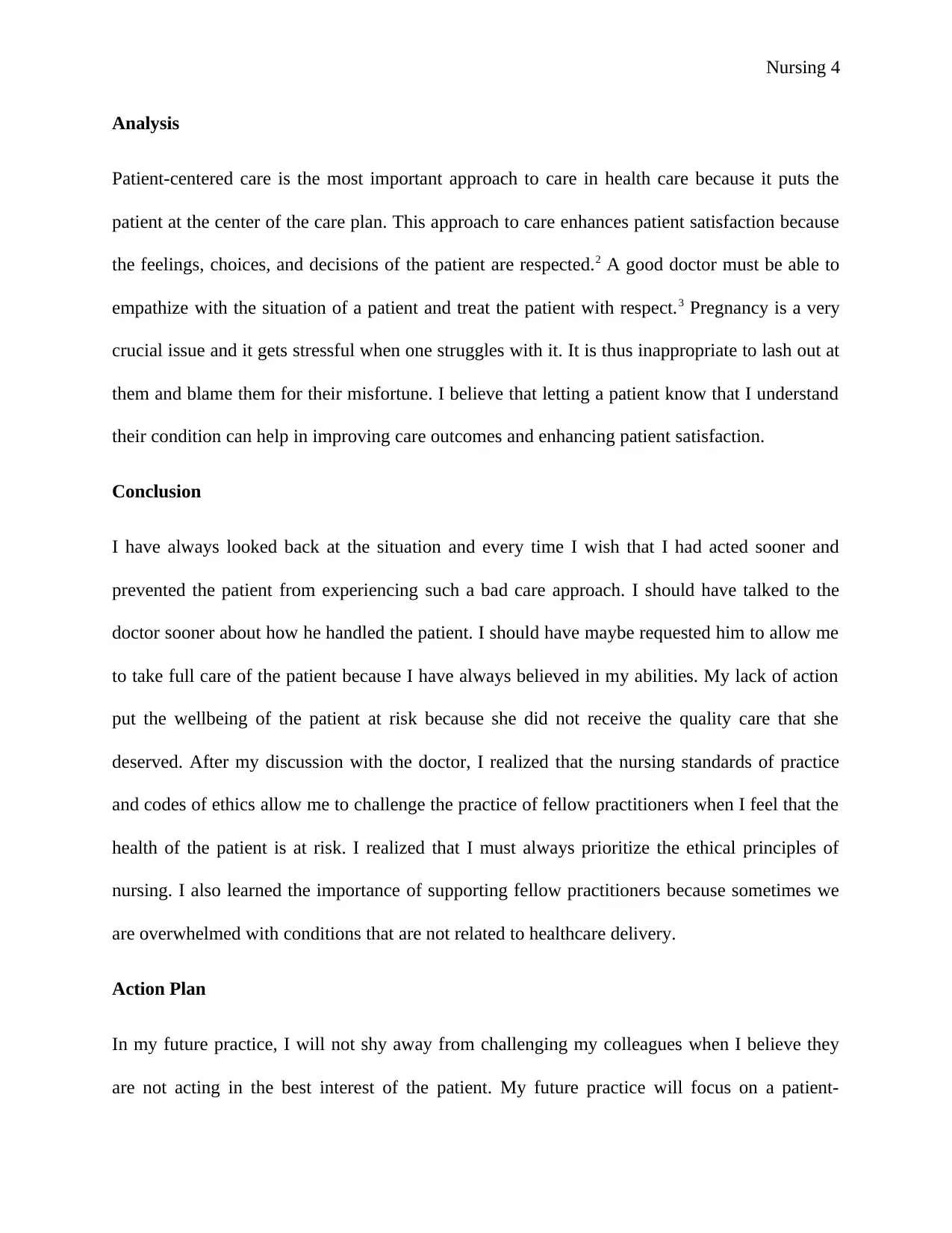
Nursing 4
Analysis
Patient-centered care is the most important approach to care in health care because it puts the
patient at the center of the care plan. This approach to care enhances patient satisfaction because
the feelings, choices, and decisions of the patient are respected.2 A good doctor must be able to
empathize with the situation of a patient and treat the patient with respect.3 Pregnancy is a very
crucial issue and it gets stressful when one struggles with it. It is thus inappropriate to lash out at
them and blame them for their misfortune. I believe that letting a patient know that I understand
their condition can help in improving care outcomes and enhancing patient satisfaction.
Conclusion
I have always looked back at the situation and every time I wish that I had acted sooner and
prevented the patient from experiencing such a bad care approach. I should have talked to the
doctor sooner about how he handled the patient. I should have maybe requested him to allow me
to take full care of the patient because I have always believed in my abilities. My lack of action
put the wellbeing of the patient at risk because she did not receive the quality care that she
deserved. After my discussion with the doctor, I realized that the nursing standards of practice
and codes of ethics allow me to challenge the practice of fellow practitioners when I feel that the
health of the patient is at risk. I realized that I must always prioritize the ethical principles of
nursing. I also learned the importance of supporting fellow practitioners because sometimes we
are overwhelmed with conditions that are not related to healthcare delivery.
Action Plan
In my future practice, I will not shy away from challenging my colleagues when I believe they
are not acting in the best interest of the patient. My future practice will focus on a patient-
Analysis
Patient-centered care is the most important approach to care in health care because it puts the
patient at the center of the care plan. This approach to care enhances patient satisfaction because
the feelings, choices, and decisions of the patient are respected.2 A good doctor must be able to
empathize with the situation of a patient and treat the patient with respect.3 Pregnancy is a very
crucial issue and it gets stressful when one struggles with it. It is thus inappropriate to lash out at
them and blame them for their misfortune. I believe that letting a patient know that I understand
their condition can help in improving care outcomes and enhancing patient satisfaction.
Conclusion
I have always looked back at the situation and every time I wish that I had acted sooner and
prevented the patient from experiencing such a bad care approach. I should have talked to the
doctor sooner about how he handled the patient. I should have maybe requested him to allow me
to take full care of the patient because I have always believed in my abilities. My lack of action
put the wellbeing of the patient at risk because she did not receive the quality care that she
deserved. After my discussion with the doctor, I realized that the nursing standards of practice
and codes of ethics allow me to challenge the practice of fellow practitioners when I feel that the
health of the patient is at risk. I realized that I must always prioritize the ethical principles of
nursing. I also learned the importance of supporting fellow practitioners because sometimes we
are overwhelmed with conditions that are not related to healthcare delivery.
Action Plan
In my future practice, I will not shy away from challenging my colleagues when I believe they
are not acting in the best interest of the patient. My future practice will focus on a patient-
Paraphrase This Document
Need a fresh take? Get an instant paraphrase of this document with our AI Paraphraser
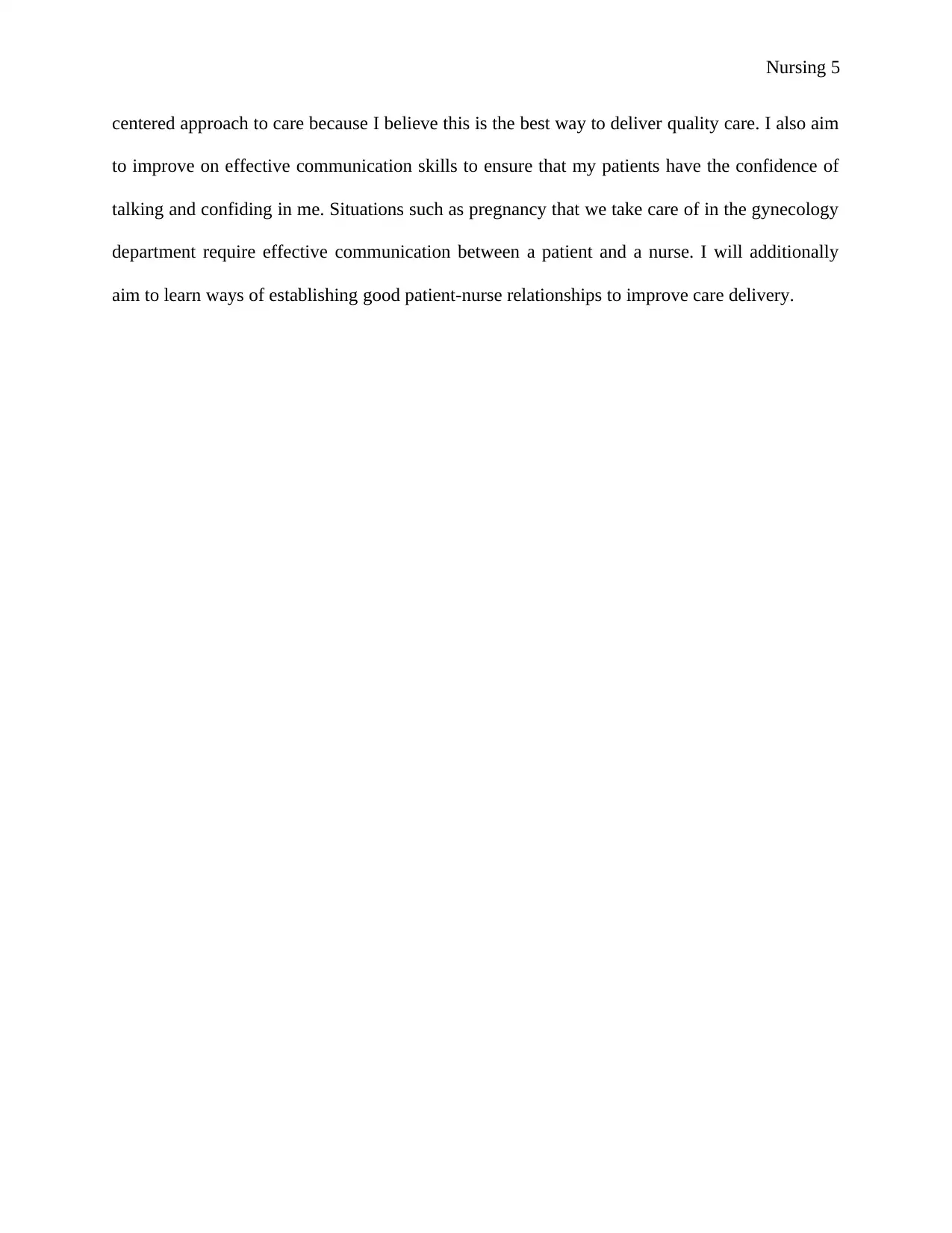
Nursing 5
centered approach to care because I believe this is the best way to deliver quality care. I also aim
to improve on effective communication skills to ensure that my patients have the confidence of
talking and confiding in me. Situations such as pregnancy that we take care of in the gynecology
department require effective communication between a patient and a nurse. I will additionally
aim to learn ways of establishing good patient-nurse relationships to improve care delivery.
centered approach to care because I believe this is the best way to deliver quality care. I also aim
to improve on effective communication skills to ensure that my patients have the confidence of
talking and confiding in me. Situations such as pregnancy that we take care of in the gynecology
department require effective communication between a patient and a nurse. I will additionally
aim to learn ways of establishing good patient-nurse relationships to improve care delivery.
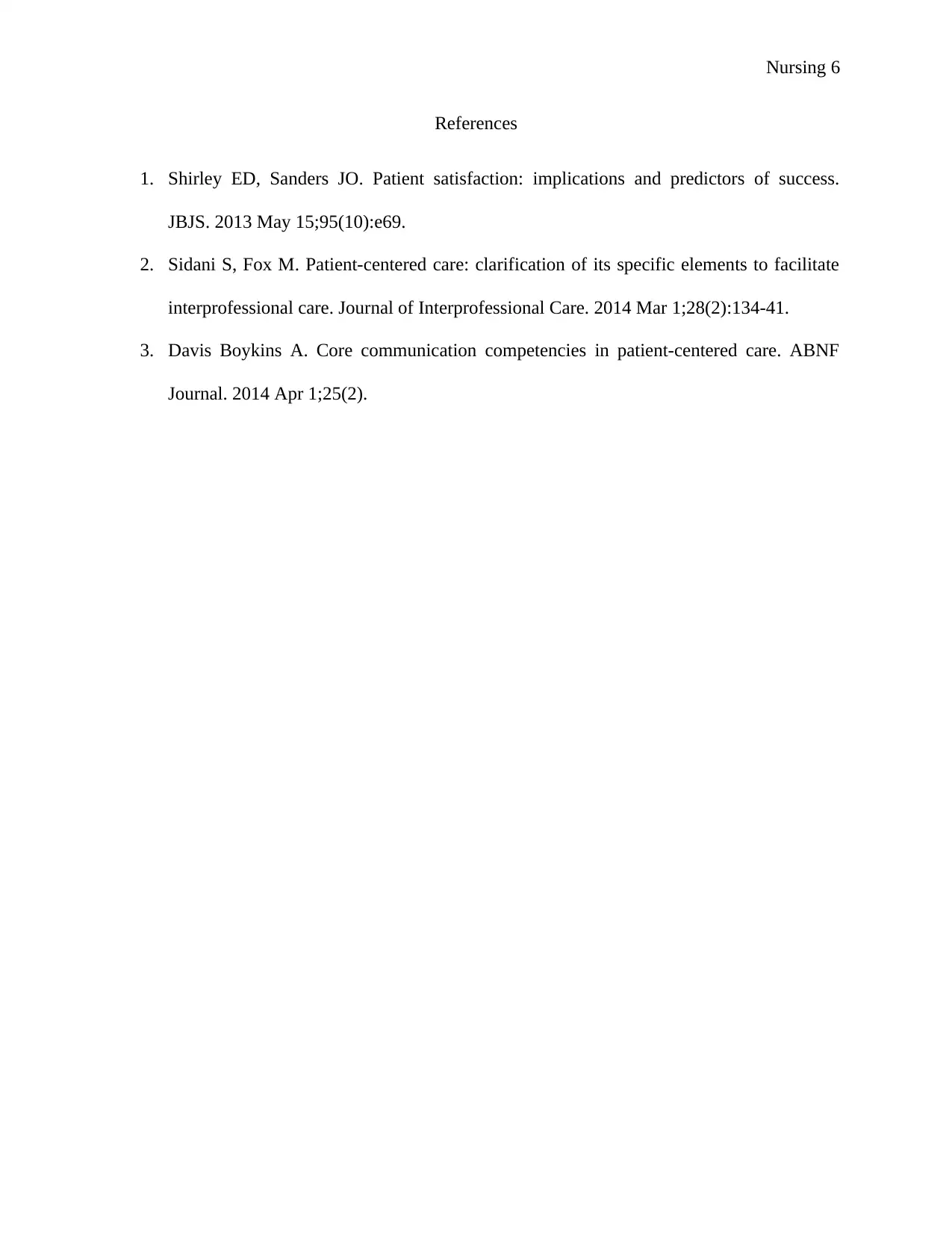
Nursing 6
References
1. Shirley ED, Sanders JO. Patient satisfaction: implications and predictors of success.
JBJS. 2013 May 15;95(10):e69.
2. Sidani S, Fox M. Patient-centered care: clarification of its specific elements to facilitate
interprofessional care. Journal of Interprofessional Care. 2014 Mar 1;28(2):134-41.
3. Davis Boykins A. Core communication competencies in patient-centered care. ABNF
Journal. 2014 Apr 1;25(2).
References
1. Shirley ED, Sanders JO. Patient satisfaction: implications and predictors of success.
JBJS. 2013 May 15;95(10):e69.
2. Sidani S, Fox M. Patient-centered care: clarification of its specific elements to facilitate
interprofessional care. Journal of Interprofessional Care. 2014 Mar 1;28(2):134-41.
3. Davis Boykins A. Core communication competencies in patient-centered care. ABNF
Journal. 2014 Apr 1;25(2).
⊘ This is a preview!⊘
Do you want full access?
Subscribe today to unlock all pages.

Trusted by 1+ million students worldwide
1 out of 6
Related Documents
Your All-in-One AI-Powered Toolkit for Academic Success.
+13062052269
info@desklib.com
Available 24*7 on WhatsApp / Email
![[object Object]](/_next/static/media/star-bottom.7253800d.svg)
Unlock your academic potential
Copyright © 2020–2026 A2Z Services. All Rights Reserved. Developed and managed by ZUCOL.





